Nestle: Analyzing the Impact of Decisions on Organization & Ethics
VerifiedAdded on 2022/09/25
|12
|3262
|19
Report
AI Summary
This report critically evaluates decisions made by Nestle and their resulting impact on the organization's image, sustainability, and profitability. It examines unethical practices like the infant formula scandal and product relabeling, detailing the negative consequences on Nestle's reputation, market share, and financial performance. The report contrasts Nestle's approach with competitors like Danone and Unilever, who prioritize ethical and sustainable practices. Recommendations are provided, emphasizing the importance of ethical leadership, sustainable business goals, and adherence to deontology ethical theory to improve Nestle's performance and rebuild trust with consumers. Desklib provides similar reports and study tools for students.
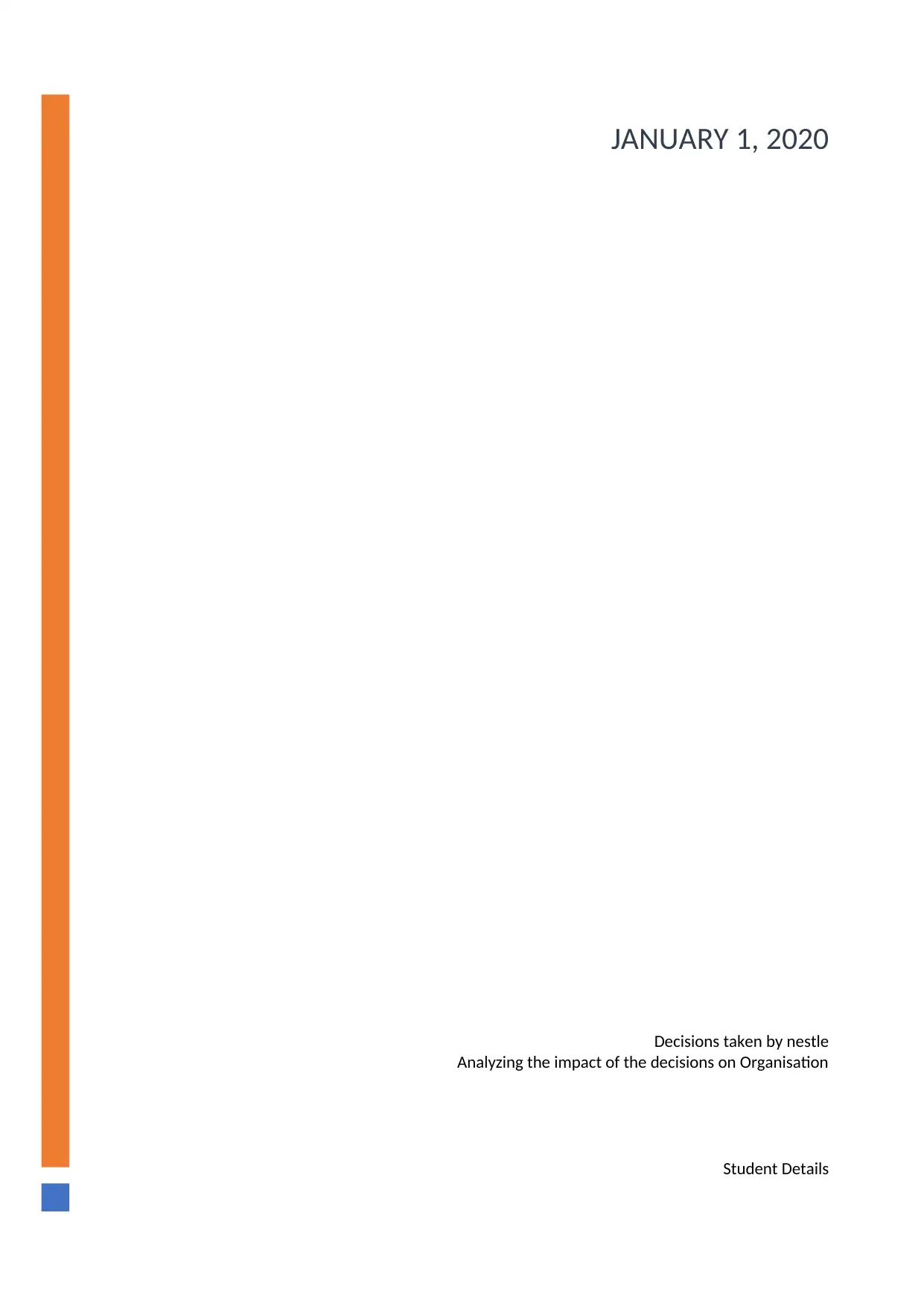
Decisions taken by nestle
Analyzing the impact of the decisions on Organisation
Student Details
JANUARY 1, 2020
Analyzing the impact of the decisions on Organisation
Student Details
JANUARY 1, 2020
Paraphrase This Document
Need a fresh take? Get an instant paraphrase of this document with our AI Paraphraser
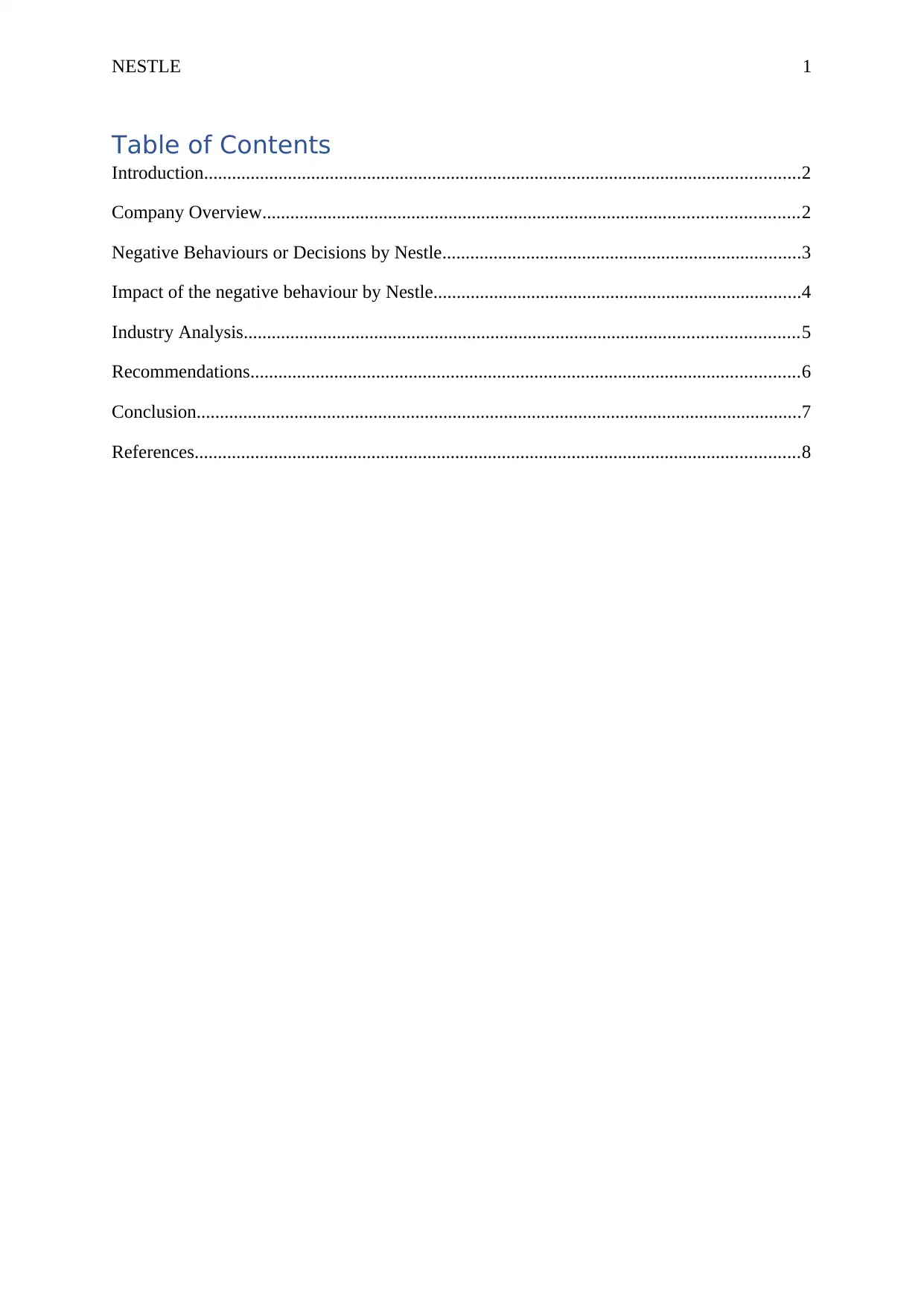
NESTLE 1
Table of Contents
Introduction................................................................................................................................2
Company Overview...................................................................................................................2
Negative Behaviours or Decisions by Nestle.............................................................................3
Impact of the negative behaviour by Nestle...............................................................................4
Industry Analysis.......................................................................................................................5
Recommendations......................................................................................................................6
Conclusion..................................................................................................................................7
References..................................................................................................................................8
Table of Contents
Introduction................................................................................................................................2
Company Overview...................................................................................................................2
Negative Behaviours or Decisions by Nestle.............................................................................3
Impact of the negative behaviour by Nestle...............................................................................4
Industry Analysis.......................................................................................................................5
Recommendations......................................................................................................................6
Conclusion..................................................................................................................................7
References..................................................................................................................................8
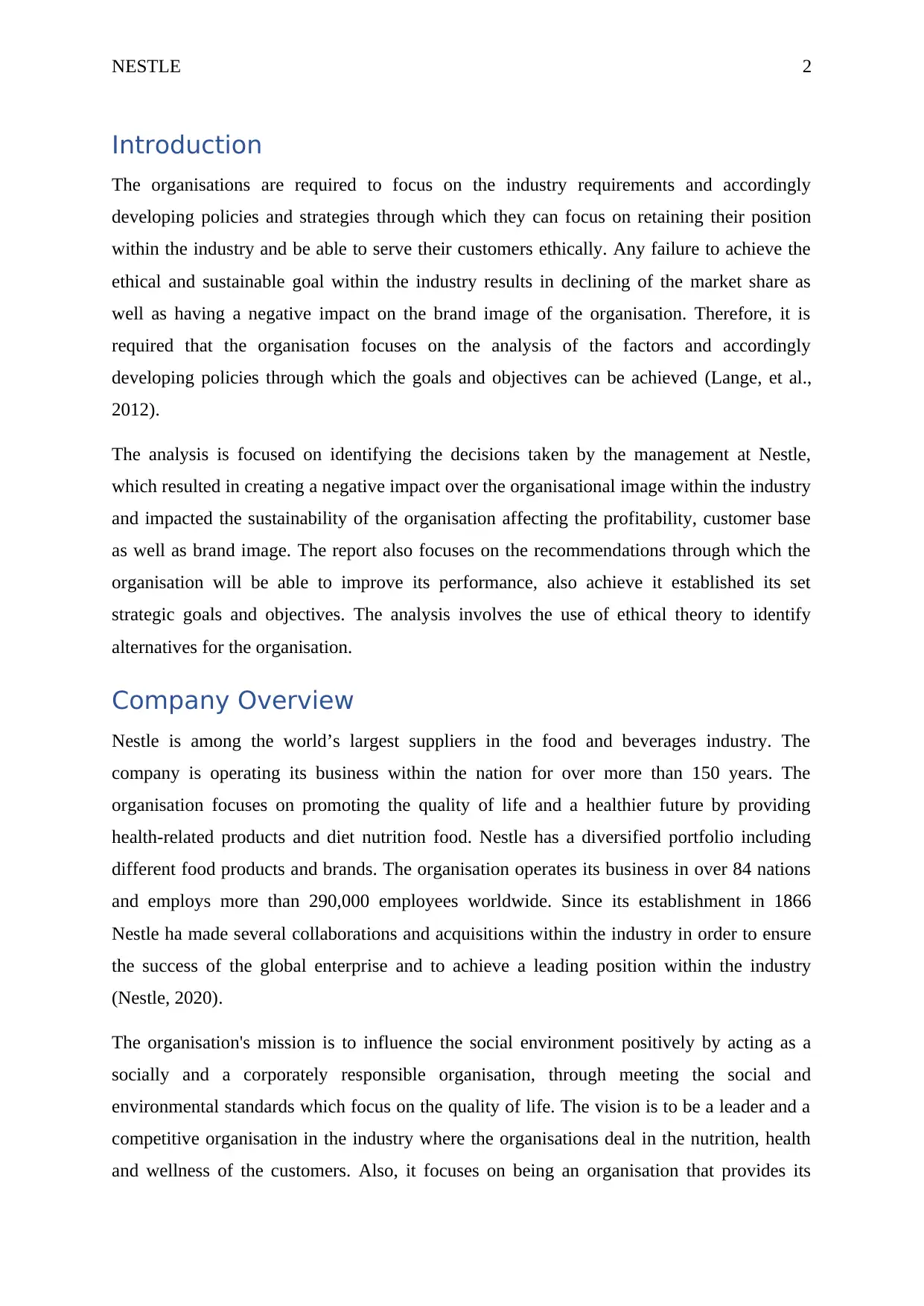
NESTLE 2
Introduction
The organisations are required to focus on the industry requirements and accordingly
developing policies and strategies through which they can focus on retaining their position
within the industry and be able to serve their customers ethically. Any failure to achieve the
ethical and sustainable goal within the industry results in declining of the market share as
well as having a negative impact on the brand image of the organisation. Therefore, it is
required that the organisation focuses on the analysis of the factors and accordingly
developing policies through which the goals and objectives can be achieved (Lange, et al.,
2012).
The analysis is focused on identifying the decisions taken by the management at Nestle,
which resulted in creating a negative impact over the organisational image within the industry
and impacted the sustainability of the organisation affecting the profitability, customer base
as well as brand image. The report also focuses on the recommendations through which the
organisation will be able to improve its performance, also achieve it established its set
strategic goals and objectives. The analysis involves the use of ethical theory to identify
alternatives for the organisation.
Company Overview
Nestle is among the world’s largest suppliers in the food and beverages industry. The
company is operating its business within the nation for over more than 150 years. The
organisation focuses on promoting the quality of life and a healthier future by providing
health-related products and diet nutrition food. Nestle has a diversified portfolio including
different food products and brands. The organisation operates its business in over 84 nations
and employs more than 290,000 employees worldwide. Since its establishment in 1866
Nestle ha made several collaborations and acquisitions within the industry in order to ensure
the success of the global enterprise and to achieve a leading position within the industry
(Nestle, 2020).
The organisation's mission is to influence the social environment positively by acting as a
socially and a corporately responsible organisation, through meeting the social and
environmental standards which focus on the quality of life. The vision is to be a leader and a
competitive organisation in the industry where the organisations deal in the nutrition, health
and wellness of the customers. Also, it focuses on being an organisation that provides its
Introduction
The organisations are required to focus on the industry requirements and accordingly
developing policies and strategies through which they can focus on retaining their position
within the industry and be able to serve their customers ethically. Any failure to achieve the
ethical and sustainable goal within the industry results in declining of the market share as
well as having a negative impact on the brand image of the organisation. Therefore, it is
required that the organisation focuses on the analysis of the factors and accordingly
developing policies through which the goals and objectives can be achieved (Lange, et al.,
2012).
The analysis is focused on identifying the decisions taken by the management at Nestle,
which resulted in creating a negative impact over the organisational image within the industry
and impacted the sustainability of the organisation affecting the profitability, customer base
as well as brand image. The report also focuses on the recommendations through which the
organisation will be able to improve its performance, also achieve it established its set
strategic goals and objectives. The analysis involves the use of ethical theory to identify
alternatives for the organisation.
Company Overview
Nestle is among the world’s largest suppliers in the food and beverages industry. The
company is operating its business within the nation for over more than 150 years. The
organisation focuses on promoting the quality of life and a healthier future by providing
health-related products and diet nutrition food. Nestle has a diversified portfolio including
different food products and brands. The organisation operates its business in over 84 nations
and employs more than 290,000 employees worldwide. Since its establishment in 1866
Nestle ha made several collaborations and acquisitions within the industry in order to ensure
the success of the global enterprise and to achieve a leading position within the industry
(Nestle, 2020).
The organisation's mission is to influence the social environment positively by acting as a
socially and a corporately responsible organisation, through meeting the social and
environmental standards which focus on the quality of life. The vision is to be a leader and a
competitive organisation in the industry where the organisations deal in the nutrition, health
and wellness of the customers. Also, it focuses on being an organisation that provides its
⊘ This is a preview!⊘
Do you want full access?
Subscribe today to unlock all pages.

Trusted by 1+ million students worldwide
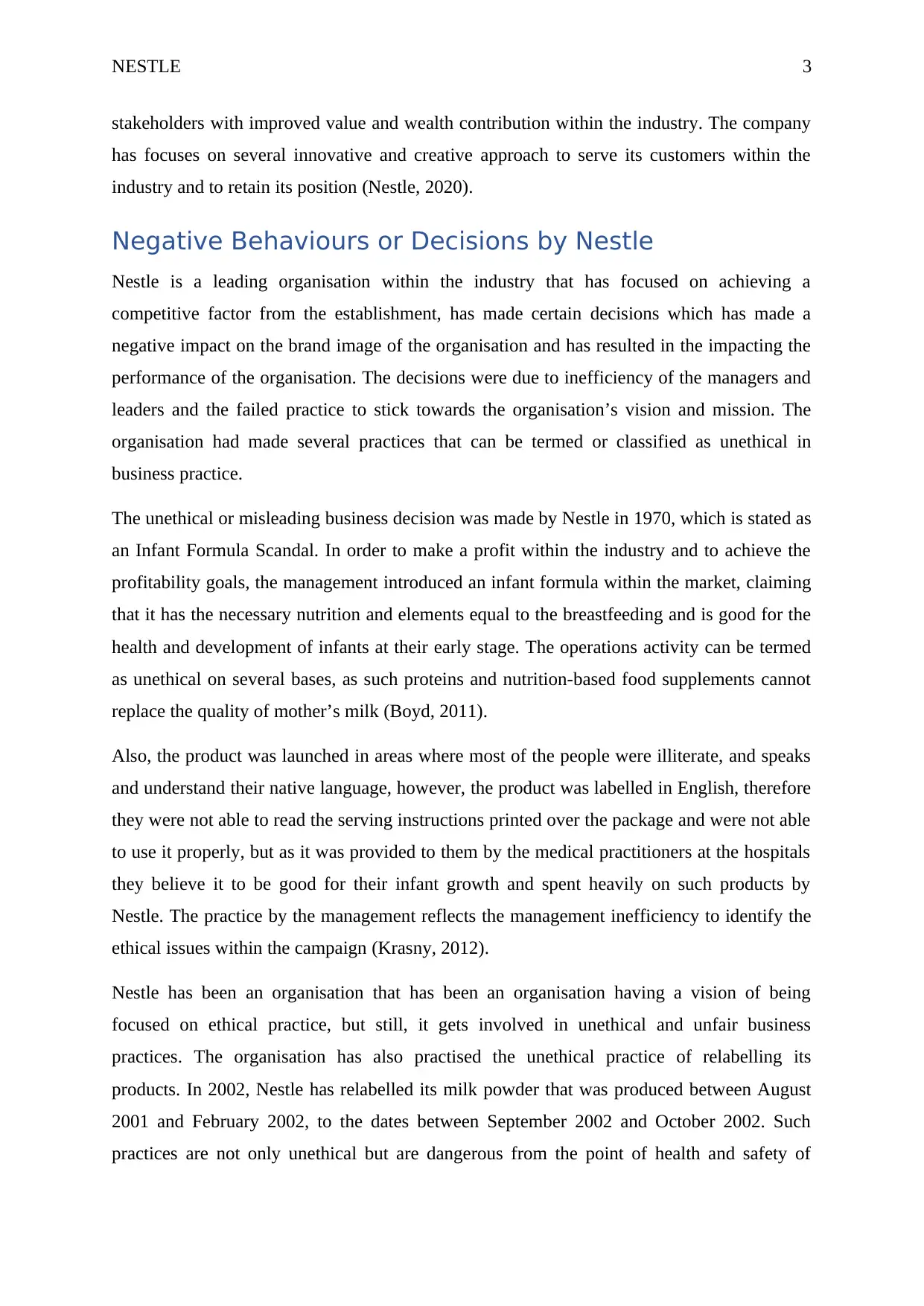
NESTLE 3
stakeholders with improved value and wealth contribution within the industry. The company
has focuses on several innovative and creative approach to serve its customers within the
industry and to retain its position (Nestle, 2020).
Negative Behaviours or Decisions by Nestle
Nestle is a leading organisation within the industry that has focused on achieving a
competitive factor from the establishment, has made certain decisions which has made a
negative impact on the brand image of the organisation and has resulted in the impacting the
performance of the organisation. The decisions were due to inefficiency of the managers and
leaders and the failed practice to stick towards the organisation’s vision and mission. The
organisation had made several practices that can be termed or classified as unethical in
business practice.
The unethical or misleading business decision was made by Nestle in 1970, which is stated as
an Infant Formula Scandal. In order to make a profit within the industry and to achieve the
profitability goals, the management introduced an infant formula within the market, claiming
that it has the necessary nutrition and elements equal to the breastfeeding and is good for the
health and development of infants at their early stage. The operations activity can be termed
as unethical on several bases, as such proteins and nutrition-based food supplements cannot
replace the quality of mother’s milk (Boyd, 2011).
Also, the product was launched in areas where most of the people were illiterate, and speaks
and understand their native language, however, the product was labelled in English, therefore
they were not able to read the serving instructions printed over the package and were not able
to use it properly, but as it was provided to them by the medical practitioners at the hospitals
they believe it to be good for their infant growth and spent heavily on such products by
Nestle. The practice by the management reflects the management inefficiency to identify the
ethical issues within the campaign (Krasny, 2012).
Nestle has been an organisation that has been an organisation having a vision of being
focused on ethical practice, but still, it gets involved in unethical and unfair business
practices. The organisation has also practised the unethical practice of relabelling its
products. In 2002, Nestle has relabelled its milk powder that was produced between August
2001 and February 2002, to the dates between September 2002 and October 2002. Such
practices are not only unethical but are dangerous from the point of health and safety of
stakeholders with improved value and wealth contribution within the industry. The company
has focuses on several innovative and creative approach to serve its customers within the
industry and to retain its position (Nestle, 2020).
Negative Behaviours or Decisions by Nestle
Nestle is a leading organisation within the industry that has focused on achieving a
competitive factor from the establishment, has made certain decisions which has made a
negative impact on the brand image of the organisation and has resulted in the impacting the
performance of the organisation. The decisions were due to inefficiency of the managers and
leaders and the failed practice to stick towards the organisation’s vision and mission. The
organisation had made several practices that can be termed or classified as unethical in
business practice.
The unethical or misleading business decision was made by Nestle in 1970, which is stated as
an Infant Formula Scandal. In order to make a profit within the industry and to achieve the
profitability goals, the management introduced an infant formula within the market, claiming
that it has the necessary nutrition and elements equal to the breastfeeding and is good for the
health and development of infants at their early stage. The operations activity can be termed
as unethical on several bases, as such proteins and nutrition-based food supplements cannot
replace the quality of mother’s milk (Boyd, 2011).
Also, the product was launched in areas where most of the people were illiterate, and speaks
and understand their native language, however, the product was labelled in English, therefore
they were not able to read the serving instructions printed over the package and were not able
to use it properly, but as it was provided to them by the medical practitioners at the hospitals
they believe it to be good for their infant growth and spent heavily on such products by
Nestle. The practice by the management reflects the management inefficiency to identify the
ethical issues within the campaign (Krasny, 2012).
Nestle has been an organisation that has been an organisation having a vision of being
focused on ethical practice, but still, it gets involved in unethical and unfair business
practices. The organisation has also practised the unethical practice of relabelling its
products. In 2002, Nestle has relabelled its milk powder that was produced between August
2001 and February 2002, to the dates between September 2002 and October 2002. Such
practices are not only unethical but are dangerous from the point of health and safety of
Paraphrase This Document
Need a fresh take? Get an instant paraphrase of this document with our AI Paraphraser
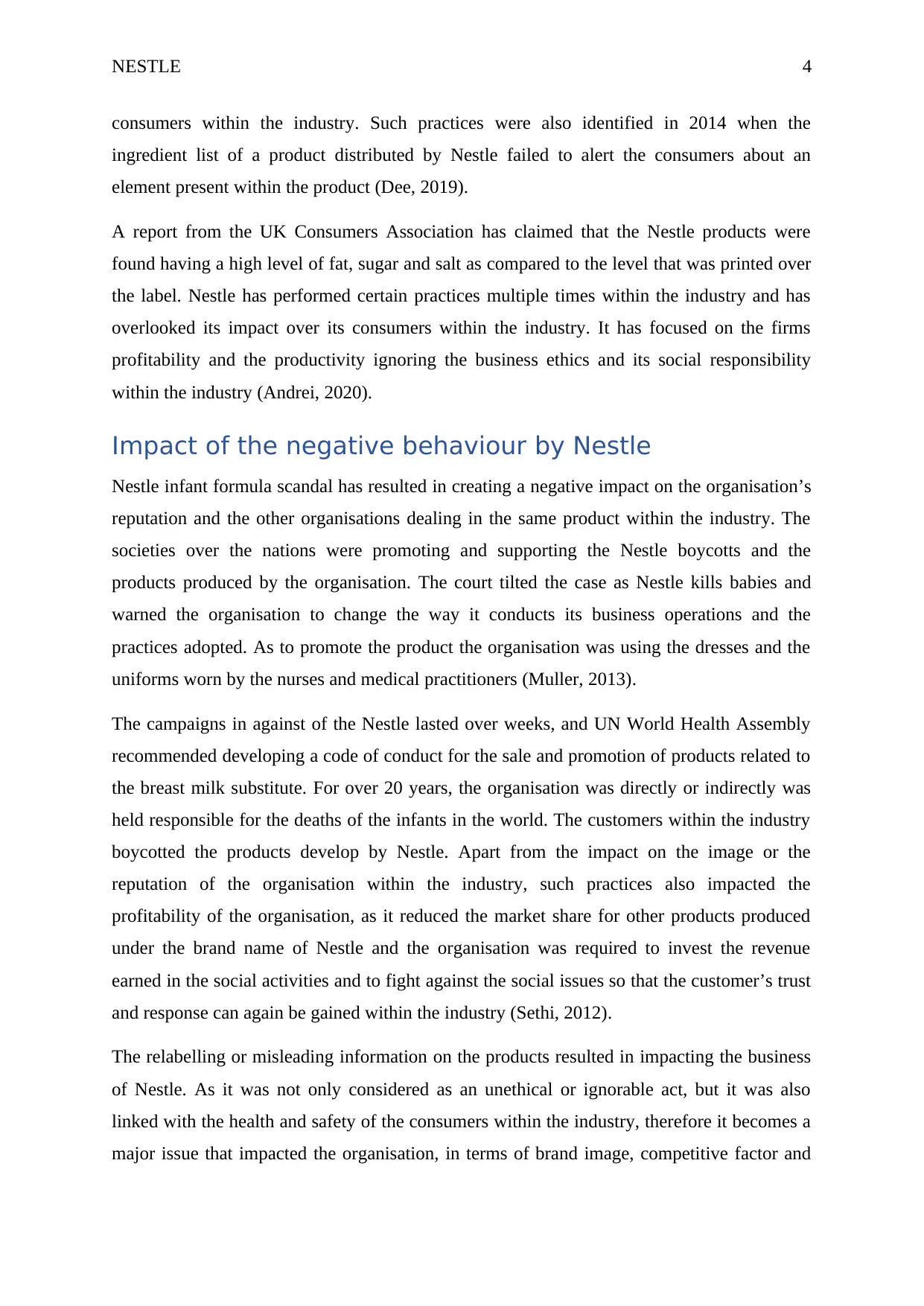
NESTLE 4
consumers within the industry. Such practices were also identified in 2014 when the
ingredient list of a product distributed by Nestle failed to alert the consumers about an
element present within the product (Dee, 2019).
A report from the UK Consumers Association has claimed that the Nestle products were
found having a high level of fat, sugar and salt as compared to the level that was printed over
the label. Nestle has performed certain practices multiple times within the industry and has
overlooked its impact over its consumers within the industry. It has focused on the firms
profitability and the productivity ignoring the business ethics and its social responsibility
within the industry (Andrei, 2020).
Impact of the negative behaviour by Nestle
Nestle infant formula scandal has resulted in creating a negative impact on the organisation’s
reputation and the other organisations dealing in the same product within the industry. The
societies over the nations were promoting and supporting the Nestle boycotts and the
products produced by the organisation. The court tilted the case as Nestle kills babies and
warned the organisation to change the way it conducts its business operations and the
practices adopted. As to promote the product the organisation was using the dresses and the
uniforms worn by the nurses and medical practitioners (Muller, 2013).
The campaigns in against of the Nestle lasted over weeks, and UN World Health Assembly
recommended developing a code of conduct for the sale and promotion of products related to
the breast milk substitute. For over 20 years, the organisation was directly or indirectly was
held responsible for the deaths of the infants in the world. The customers within the industry
boycotted the products develop by Nestle. Apart from the impact on the image or the
reputation of the organisation within the industry, such practices also impacted the
profitability of the organisation, as it reduced the market share for other products produced
under the brand name of Nestle and the organisation was required to invest the revenue
earned in the social activities and to fight against the social issues so that the customer’s trust
and response can again be gained within the industry (Sethi, 2012).
The relabelling or misleading information on the products resulted in impacting the business
of Nestle. As it was not only considered as an unethical or ignorable act, but it was also
linked with the health and safety of the consumers within the industry, therefore it becomes a
major issue that impacted the organisation, in terms of brand image, competitive factor and
consumers within the industry. Such practices were also identified in 2014 when the
ingredient list of a product distributed by Nestle failed to alert the consumers about an
element present within the product (Dee, 2019).
A report from the UK Consumers Association has claimed that the Nestle products were
found having a high level of fat, sugar and salt as compared to the level that was printed over
the label. Nestle has performed certain practices multiple times within the industry and has
overlooked its impact over its consumers within the industry. It has focused on the firms
profitability and the productivity ignoring the business ethics and its social responsibility
within the industry (Andrei, 2020).
Impact of the negative behaviour by Nestle
Nestle infant formula scandal has resulted in creating a negative impact on the organisation’s
reputation and the other organisations dealing in the same product within the industry. The
societies over the nations were promoting and supporting the Nestle boycotts and the
products produced by the organisation. The court tilted the case as Nestle kills babies and
warned the organisation to change the way it conducts its business operations and the
practices adopted. As to promote the product the organisation was using the dresses and the
uniforms worn by the nurses and medical practitioners (Muller, 2013).
The campaigns in against of the Nestle lasted over weeks, and UN World Health Assembly
recommended developing a code of conduct for the sale and promotion of products related to
the breast milk substitute. For over 20 years, the organisation was directly or indirectly was
held responsible for the deaths of the infants in the world. The customers within the industry
boycotted the products develop by Nestle. Apart from the impact on the image or the
reputation of the organisation within the industry, such practices also impacted the
profitability of the organisation, as it reduced the market share for other products produced
under the brand name of Nestle and the organisation was required to invest the revenue
earned in the social activities and to fight against the social issues so that the customer’s trust
and response can again be gained within the industry (Sethi, 2012).
The relabelling or misleading information on the products resulted in impacting the business
of Nestle. As it was not only considered as an unethical or ignorable act, but it was also
linked with the health and safety of the consumers within the industry, therefore it becomes a
major issue that impacted the organisation, in terms of brand image, competitive factor and
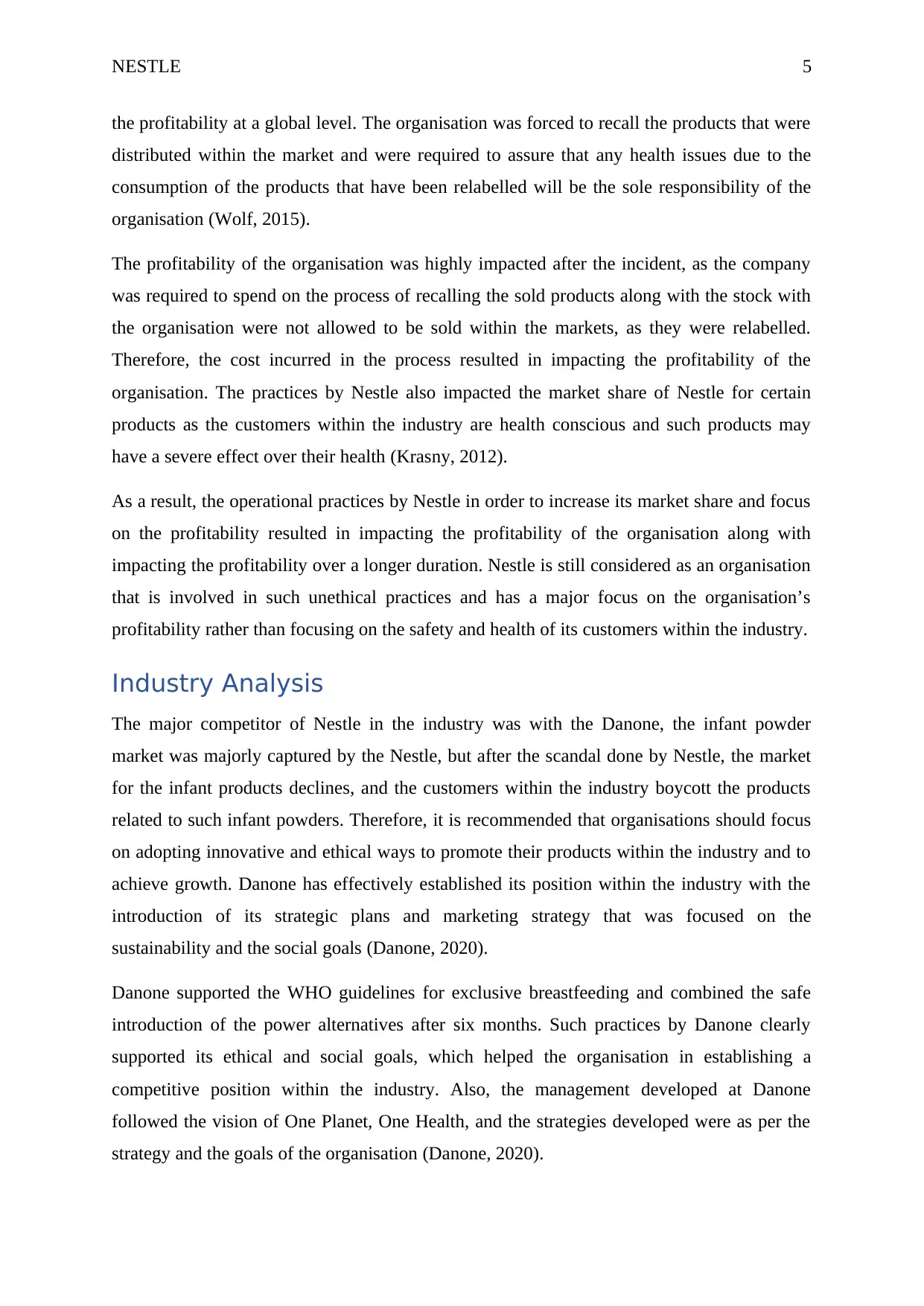
NESTLE 5
the profitability at a global level. The organisation was forced to recall the products that were
distributed within the market and were required to assure that any health issues due to the
consumption of the products that have been relabelled will be the sole responsibility of the
organisation (Wolf, 2015).
The profitability of the organisation was highly impacted after the incident, as the company
was required to spend on the process of recalling the sold products along with the stock with
the organisation were not allowed to be sold within the markets, as they were relabelled.
Therefore, the cost incurred in the process resulted in impacting the profitability of the
organisation. The practices by Nestle also impacted the market share of Nestle for certain
products as the customers within the industry are health conscious and such products may
have a severe effect over their health (Krasny, 2012).
As a result, the operational practices by Nestle in order to increase its market share and focus
on the profitability resulted in impacting the profitability of the organisation along with
impacting the profitability over a longer duration. Nestle is still considered as an organisation
that is involved in such unethical practices and has a major focus on the organisation’s
profitability rather than focusing on the safety and health of its customers within the industry.
Industry Analysis
The major competitor of Nestle in the industry was with the Danone, the infant powder
market was majorly captured by the Nestle, but after the scandal done by Nestle, the market
for the infant products declines, and the customers within the industry boycott the products
related to such infant powders. Therefore, it is recommended that organisations should focus
on adopting innovative and ethical ways to promote their products within the industry and to
achieve growth. Danone has effectively established its position within the industry with the
introduction of its strategic plans and marketing strategy that was focused on the
sustainability and the social goals (Danone, 2020).
Danone supported the WHO guidelines for exclusive breastfeeding and combined the safe
introduction of the power alternatives after six months. Such practices by Danone clearly
supported its ethical and social goals, which helped the organisation in establishing a
competitive position within the industry. Also, the management developed at Danone
followed the vision of One Planet, One Health, and the strategies developed were as per the
strategy and the goals of the organisation (Danone, 2020).
the profitability at a global level. The organisation was forced to recall the products that were
distributed within the market and were required to assure that any health issues due to the
consumption of the products that have been relabelled will be the sole responsibility of the
organisation (Wolf, 2015).
The profitability of the organisation was highly impacted after the incident, as the company
was required to spend on the process of recalling the sold products along with the stock with
the organisation were not allowed to be sold within the markets, as they were relabelled.
Therefore, the cost incurred in the process resulted in impacting the profitability of the
organisation. The practices by Nestle also impacted the market share of Nestle for certain
products as the customers within the industry are health conscious and such products may
have a severe effect over their health (Krasny, 2012).
As a result, the operational practices by Nestle in order to increase its market share and focus
on the profitability resulted in impacting the profitability of the organisation along with
impacting the profitability over a longer duration. Nestle is still considered as an organisation
that is involved in such unethical practices and has a major focus on the organisation’s
profitability rather than focusing on the safety and health of its customers within the industry.
Industry Analysis
The major competitor of Nestle in the industry was with the Danone, the infant powder
market was majorly captured by the Nestle, but after the scandal done by Nestle, the market
for the infant products declines, and the customers within the industry boycott the products
related to such infant powders. Therefore, it is recommended that organisations should focus
on adopting innovative and ethical ways to promote their products within the industry and to
achieve growth. Danone has effectively established its position within the industry with the
introduction of its strategic plans and marketing strategy that was focused on the
sustainability and the social goals (Danone, 2020).
Danone supported the WHO guidelines for exclusive breastfeeding and combined the safe
introduction of the power alternatives after six months. Such practices by Danone clearly
supported its ethical and social goals, which helped the organisation in establishing a
competitive position within the industry. Also, the management developed at Danone
followed the vision of One Planet, One Health, and the strategies developed were as per the
strategy and the goals of the organisation (Danone, 2020).
⊘ This is a preview!⊘
Do you want full access?
Subscribe today to unlock all pages.

Trusted by 1+ million students worldwide
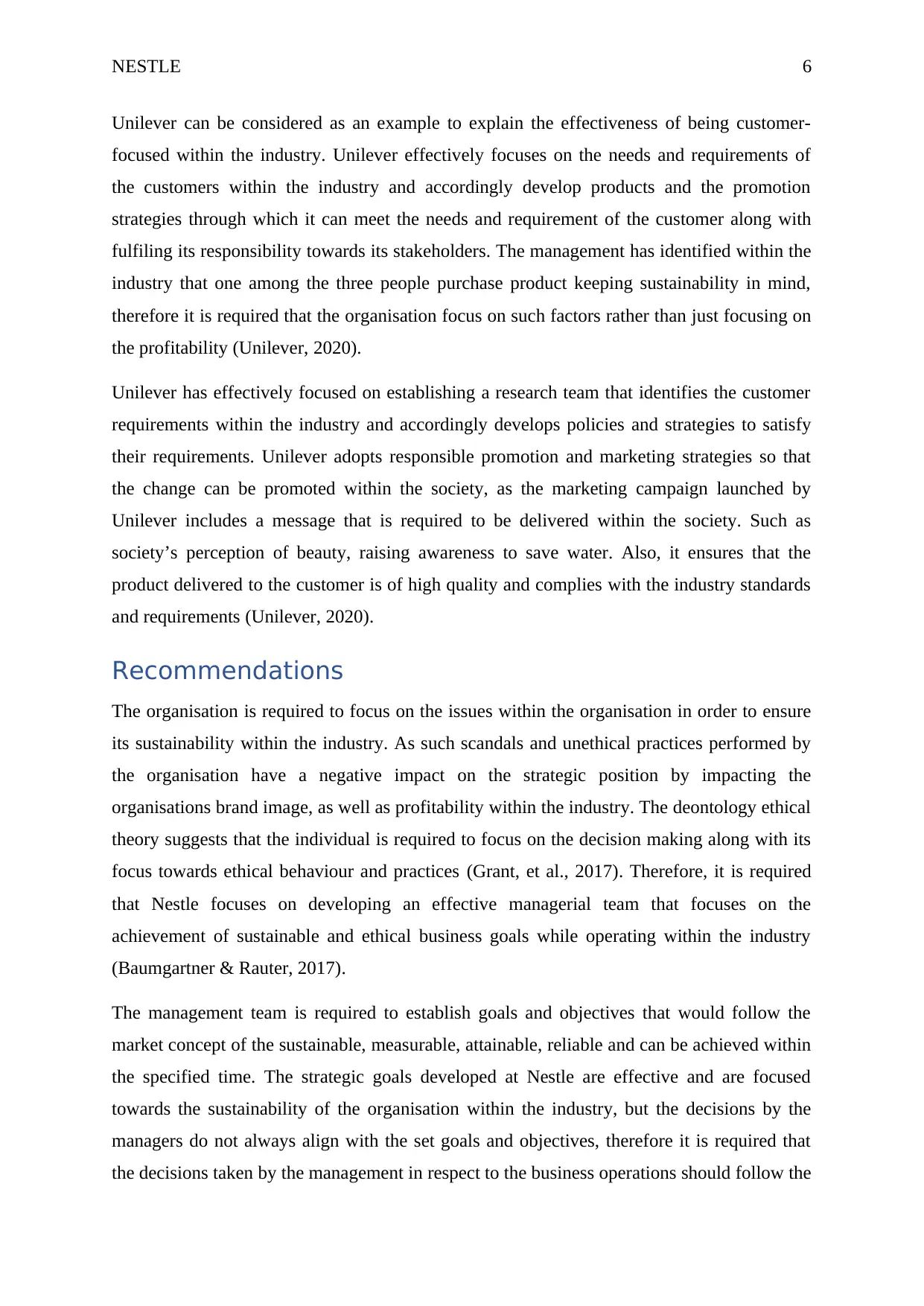
NESTLE 6
Unilever can be considered as an example to explain the effectiveness of being customer-
focused within the industry. Unilever effectively focuses on the needs and requirements of
the customers within the industry and accordingly develop products and the promotion
strategies through which it can meet the needs and requirement of the customer along with
fulfiling its responsibility towards its stakeholders. The management has identified within the
industry that one among the three people purchase product keeping sustainability in mind,
therefore it is required that the organisation focus on such factors rather than just focusing on
the profitability (Unilever, 2020).
Unilever has effectively focused on establishing a research team that identifies the customer
requirements within the industry and accordingly develops policies and strategies to satisfy
their requirements. Unilever adopts responsible promotion and marketing strategies so that
the change can be promoted within the society, as the marketing campaign launched by
Unilever includes a message that is required to be delivered within the society. Such as
society’s perception of beauty, raising awareness to save water. Also, it ensures that the
product delivered to the customer is of high quality and complies with the industry standards
and requirements (Unilever, 2020).
Recommendations
The organisation is required to focus on the issues within the organisation in order to ensure
its sustainability within the industry. As such scandals and unethical practices performed by
the organisation have a negative impact on the strategic position by impacting the
organisations brand image, as well as profitability within the industry. The deontology ethical
theory suggests that the individual is required to focus on the decision making along with its
focus towards ethical behaviour and practices (Grant, et al., 2017). Therefore, it is required
that Nestle focuses on developing an effective managerial team that focuses on the
achievement of sustainable and ethical business goals while operating within the industry
(Baumgartner & Rauter, 2017).
The management team is required to establish goals and objectives that would follow the
market concept of the sustainable, measurable, attainable, reliable and can be achieved within
the specified time. The strategic goals developed at Nestle are effective and are focused
towards the sustainability of the organisation within the industry, but the decisions by the
managers do not always align with the set goals and objectives, therefore it is required that
the decisions taken by the management in respect to the business operations should follow the
Unilever can be considered as an example to explain the effectiveness of being customer-
focused within the industry. Unilever effectively focuses on the needs and requirements of
the customers within the industry and accordingly develop products and the promotion
strategies through which it can meet the needs and requirement of the customer along with
fulfiling its responsibility towards its stakeholders. The management has identified within the
industry that one among the three people purchase product keeping sustainability in mind,
therefore it is required that the organisation focus on such factors rather than just focusing on
the profitability (Unilever, 2020).
Unilever has effectively focused on establishing a research team that identifies the customer
requirements within the industry and accordingly develops policies and strategies to satisfy
their requirements. Unilever adopts responsible promotion and marketing strategies so that
the change can be promoted within the society, as the marketing campaign launched by
Unilever includes a message that is required to be delivered within the society. Such as
society’s perception of beauty, raising awareness to save water. Also, it ensures that the
product delivered to the customer is of high quality and complies with the industry standards
and requirements (Unilever, 2020).
Recommendations
The organisation is required to focus on the issues within the organisation in order to ensure
its sustainability within the industry. As such scandals and unethical practices performed by
the organisation have a negative impact on the strategic position by impacting the
organisations brand image, as well as profitability within the industry. The deontology ethical
theory suggests that the individual is required to focus on the decision making along with its
focus towards ethical behaviour and practices (Grant, et al., 2017). Therefore, it is required
that Nestle focuses on developing an effective managerial team that focuses on the
achievement of sustainable and ethical business goals while operating within the industry
(Baumgartner & Rauter, 2017).
The management team is required to establish goals and objectives that would follow the
market concept of the sustainable, measurable, attainable, reliable and can be achieved within
the specified time. The strategic goals developed at Nestle are effective and are focused
towards the sustainability of the organisation within the industry, but the decisions by the
managers do not always align with the set goals and objectives, therefore it is required that
the decisions taken by the management in respect to the business operations should follow the
Paraphrase This Document
Need a fresh take? Get an instant paraphrase of this document with our AI Paraphraser
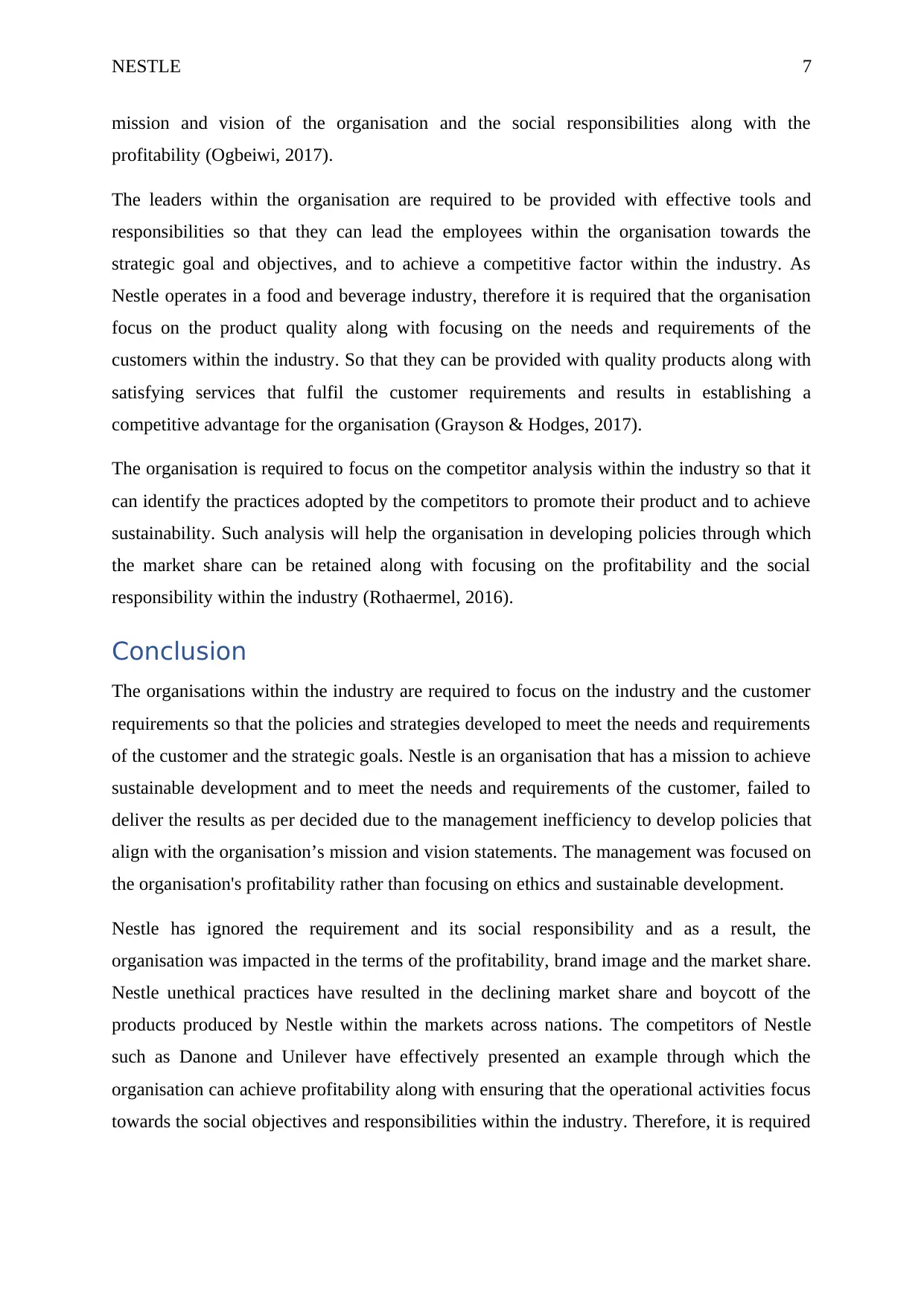
NESTLE 7
mission and vision of the organisation and the social responsibilities along with the
profitability (Ogbeiwi, 2017).
The leaders within the organisation are required to be provided with effective tools and
responsibilities so that they can lead the employees within the organisation towards the
strategic goal and objectives, and to achieve a competitive factor within the industry. As
Nestle operates in a food and beverage industry, therefore it is required that the organisation
focus on the product quality along with focusing on the needs and requirements of the
customers within the industry. So that they can be provided with quality products along with
satisfying services that fulfil the customer requirements and results in establishing a
competitive advantage for the organisation (Grayson & Hodges, 2017).
The organisation is required to focus on the competitor analysis within the industry so that it
can identify the practices adopted by the competitors to promote their product and to achieve
sustainability. Such analysis will help the organisation in developing policies through which
the market share can be retained along with focusing on the profitability and the social
responsibility within the industry (Rothaermel, 2016).
Conclusion
The organisations within the industry are required to focus on the industry and the customer
requirements so that the policies and strategies developed to meet the needs and requirements
of the customer and the strategic goals. Nestle is an organisation that has a mission to achieve
sustainable development and to meet the needs and requirements of the customer, failed to
deliver the results as per decided due to the management inefficiency to develop policies that
align with the organisation’s mission and vision statements. The management was focused on
the organisation's profitability rather than focusing on ethics and sustainable development.
Nestle has ignored the requirement and its social responsibility and as a result, the
organisation was impacted in the terms of the profitability, brand image and the market share.
Nestle unethical practices have resulted in the declining market share and boycott of the
products produced by Nestle within the markets across nations. The competitors of Nestle
such as Danone and Unilever have effectively presented an example through which the
organisation can achieve profitability along with ensuring that the operational activities focus
towards the social objectives and responsibilities within the industry. Therefore, it is required
mission and vision of the organisation and the social responsibilities along with the
profitability (Ogbeiwi, 2017).
The leaders within the organisation are required to be provided with effective tools and
responsibilities so that they can lead the employees within the organisation towards the
strategic goal and objectives, and to achieve a competitive factor within the industry. As
Nestle operates in a food and beverage industry, therefore it is required that the organisation
focus on the product quality along with focusing on the needs and requirements of the
customers within the industry. So that they can be provided with quality products along with
satisfying services that fulfil the customer requirements and results in establishing a
competitive advantage for the organisation (Grayson & Hodges, 2017).
The organisation is required to focus on the competitor analysis within the industry so that it
can identify the practices adopted by the competitors to promote their product and to achieve
sustainability. Such analysis will help the organisation in developing policies through which
the market share can be retained along with focusing on the profitability and the social
responsibility within the industry (Rothaermel, 2016).
Conclusion
The organisations within the industry are required to focus on the industry and the customer
requirements so that the policies and strategies developed to meet the needs and requirements
of the customer and the strategic goals. Nestle is an organisation that has a mission to achieve
sustainable development and to meet the needs and requirements of the customer, failed to
deliver the results as per decided due to the management inefficiency to develop policies that
align with the organisation’s mission and vision statements. The management was focused on
the organisation's profitability rather than focusing on ethics and sustainable development.
Nestle has ignored the requirement and its social responsibility and as a result, the
organisation was impacted in the terms of the profitability, brand image and the market share.
Nestle unethical practices have resulted in the declining market share and boycott of the
products produced by Nestle within the markets across nations. The competitors of Nestle
such as Danone and Unilever have effectively presented an example through which the
organisation can achieve profitability along with ensuring that the operational activities focus
towards the social objectives and responsibilities within the industry. Therefore, it is required
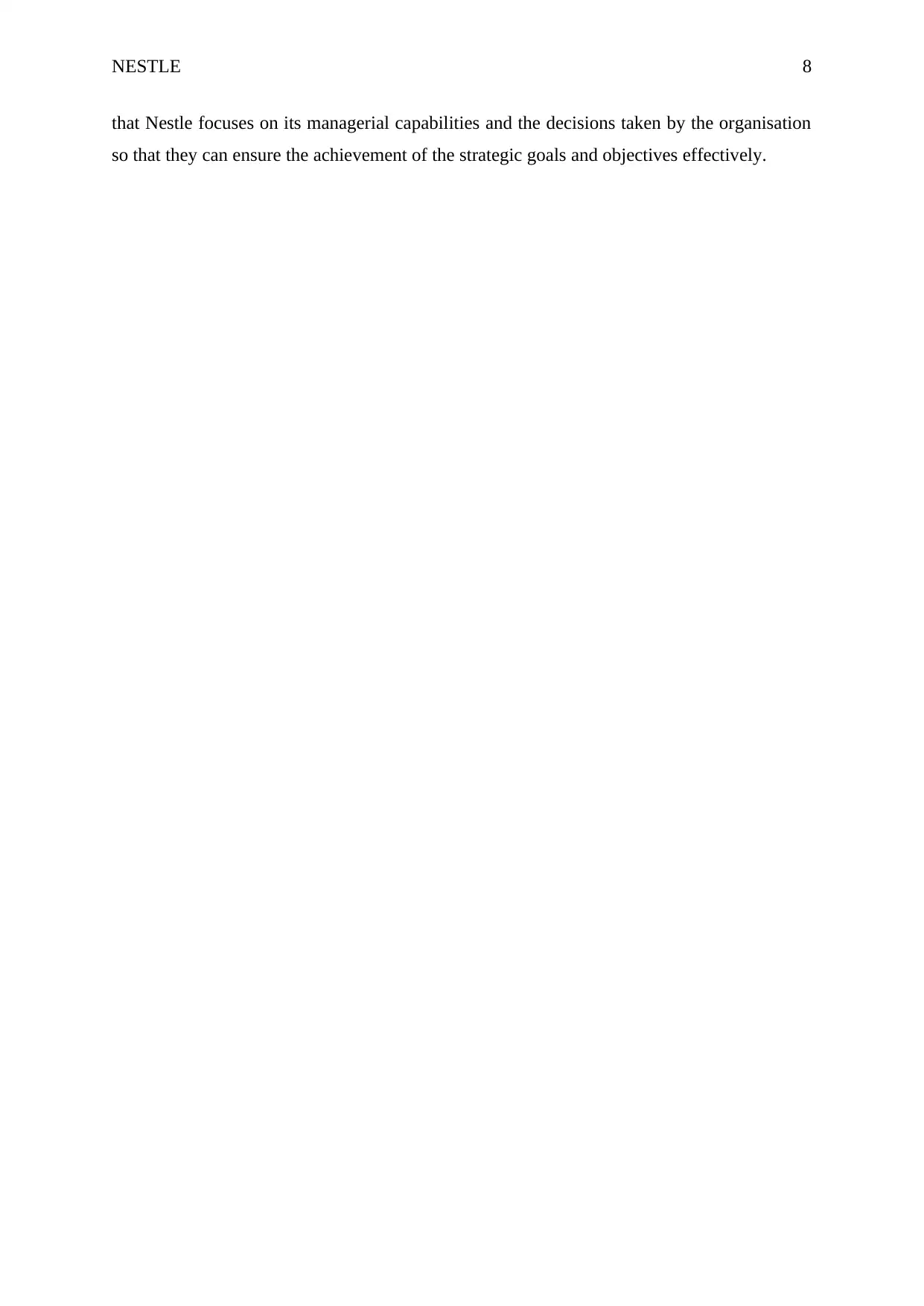
NESTLE 8
that Nestle focuses on its managerial capabilities and the decisions taken by the organisation
so that they can ensure the achievement of the strategic goals and objectives effectively.
that Nestle focuses on its managerial capabilities and the decisions taken by the organisation
so that they can ensure the achievement of the strategic goals and objectives effectively.
⊘ This is a preview!⊘
Do you want full access?
Subscribe today to unlock all pages.

Trusted by 1+ million students worldwide
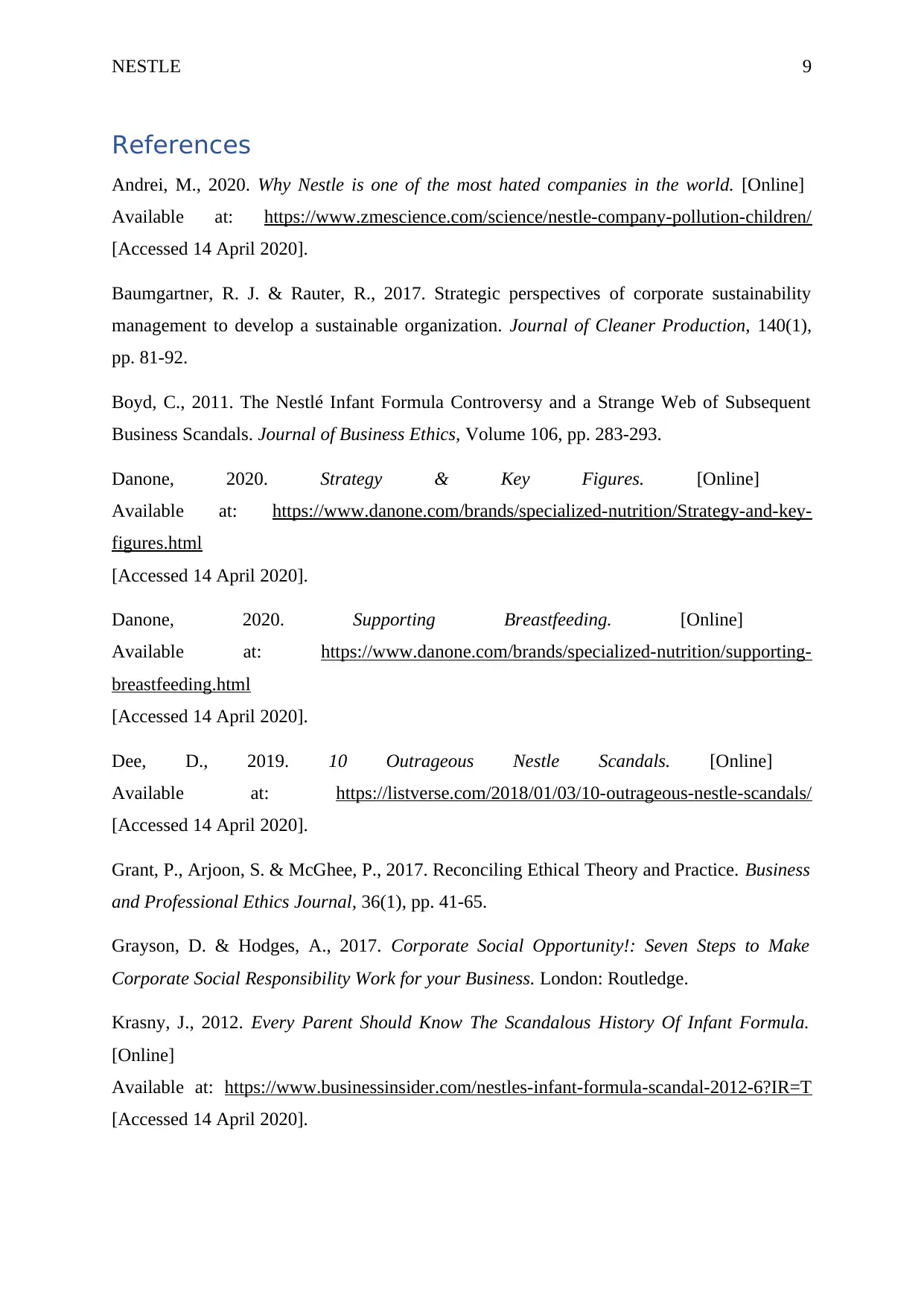
NESTLE 9
References
Andrei, M., 2020. Why Nestle is one of the most hated companies in the world. [Online]
Available at: https://www.zmescience.com/science/nestle-company-pollution-children/
[Accessed 14 April 2020].
Baumgartner, R. J. & Rauter, R., 2017. Strategic perspectives of corporate sustainability
management to develop a sustainable organization. Journal of Cleaner Production, 140(1),
pp. 81-92.
Boyd, C., 2011. The Nestlé Infant Formula Controversy and a Strange Web of Subsequent
Business Scandals. Journal of Business Ethics, Volume 106, pp. 283-293.
Danone, 2020. Strategy & Key Figures. [Online]
Available at: https://www.danone.com/brands/specialized-nutrition/Strategy-and-key-
figures.html
[Accessed 14 April 2020].
Danone, 2020. Supporting Breastfeeding. [Online]
Available at: https://www.danone.com/brands/specialized-nutrition/supporting-
breastfeeding.html
[Accessed 14 April 2020].
Dee, D., 2019. 10 Outrageous Nestle Scandals. [Online]
Available at: https://listverse.com/2018/01/03/10-outrageous-nestle-scandals/
[Accessed 14 April 2020].
Grant, P., Arjoon, S. & McGhee, P., 2017. Reconciling Ethical Theory and Practice. Business
and Professional Ethics Journal, 36(1), pp. 41-65.
Grayson, D. & Hodges, A., 2017. Corporate Social Opportunity!: Seven Steps to Make
Corporate Social Responsibility Work for your Business. London: Routledge.
Krasny, J., 2012. Every Parent Should Know The Scandalous History Of Infant Formula.
[Online]
Available at: https://www.businessinsider.com/nestles-infant-formula-scandal-2012-6?IR=T
[Accessed 14 April 2020].
References
Andrei, M., 2020. Why Nestle is one of the most hated companies in the world. [Online]
Available at: https://www.zmescience.com/science/nestle-company-pollution-children/
[Accessed 14 April 2020].
Baumgartner, R. J. & Rauter, R., 2017. Strategic perspectives of corporate sustainability
management to develop a sustainable organization. Journal of Cleaner Production, 140(1),
pp. 81-92.
Boyd, C., 2011. The Nestlé Infant Formula Controversy and a Strange Web of Subsequent
Business Scandals. Journal of Business Ethics, Volume 106, pp. 283-293.
Danone, 2020. Strategy & Key Figures. [Online]
Available at: https://www.danone.com/brands/specialized-nutrition/Strategy-and-key-
figures.html
[Accessed 14 April 2020].
Danone, 2020. Supporting Breastfeeding. [Online]
Available at: https://www.danone.com/brands/specialized-nutrition/supporting-
breastfeeding.html
[Accessed 14 April 2020].
Dee, D., 2019. 10 Outrageous Nestle Scandals. [Online]
Available at: https://listverse.com/2018/01/03/10-outrageous-nestle-scandals/
[Accessed 14 April 2020].
Grant, P., Arjoon, S. & McGhee, P., 2017. Reconciling Ethical Theory and Practice. Business
and Professional Ethics Journal, 36(1), pp. 41-65.
Grayson, D. & Hodges, A., 2017. Corporate Social Opportunity!: Seven Steps to Make
Corporate Social Responsibility Work for your Business. London: Routledge.
Krasny, J., 2012. Every Parent Should Know The Scandalous History Of Infant Formula.
[Online]
Available at: https://www.businessinsider.com/nestles-infant-formula-scandal-2012-6?IR=T
[Accessed 14 April 2020].
Paraphrase This Document
Need a fresh take? Get an instant paraphrase of this document with our AI Paraphraser
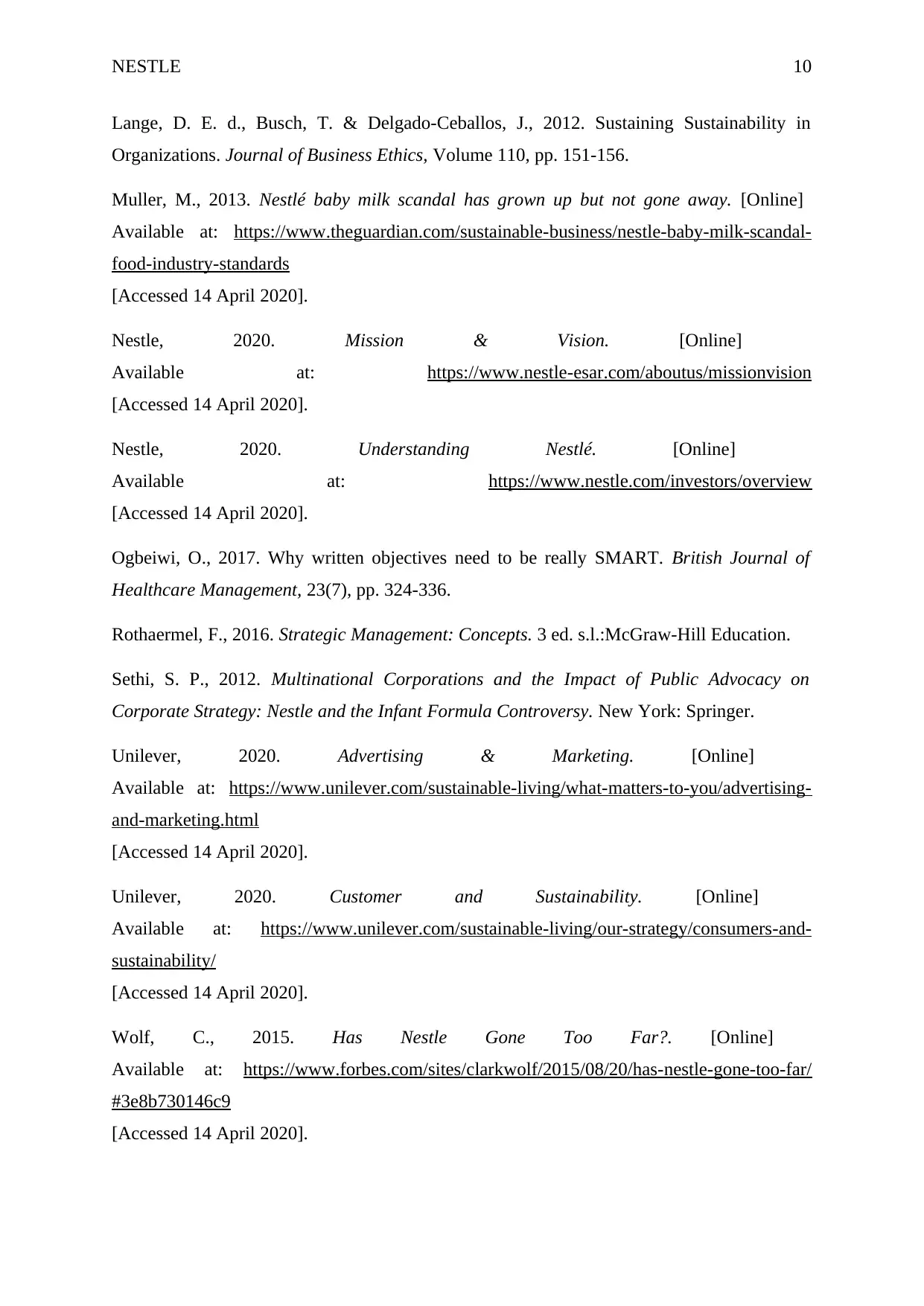
NESTLE 10
Lange, D. E. d., Busch, T. & Delgado-Ceballos, J., 2012. Sustaining Sustainability in
Organizations. Journal of Business Ethics, Volume 110, pp. 151-156.
Muller, M., 2013. Nestlé baby milk scandal has grown up but not gone away. [Online]
Available at: https://www.theguardian.com/sustainable-business/nestle-baby-milk-scandal-
food-industry-standards
[Accessed 14 April 2020].
Nestle, 2020. Mission & Vision. [Online]
Available at: https://www.nestle-esar.com/aboutus/missionvision
[Accessed 14 April 2020].
Nestle, 2020. Understanding Nestlé. [Online]
Available at: https://www.nestle.com/investors/overview
[Accessed 14 April 2020].
Ogbeiwi, O., 2017. Why written objectives need to be really SMART. British Journal of
Healthcare Management, 23(7), pp. 324-336.
Rothaermel, F., 2016. Strategic Management: Concepts. 3 ed. s.l.:McGraw-Hill Education.
Sethi, S. P., 2012. Multinational Corporations and the Impact of Public Advocacy on
Corporate Strategy: Nestle and the Infant Formula Controversy. New York: Springer.
Unilever, 2020. Advertising & Marketing. [Online]
Available at: https://www.unilever.com/sustainable-living/what-matters-to-you/advertising-
and-marketing.html
[Accessed 14 April 2020].
Unilever, 2020. Customer and Sustainability. [Online]
Available at: https://www.unilever.com/sustainable-living/our-strategy/consumers-and-
sustainability/
[Accessed 14 April 2020].
Wolf, C., 2015. Has Nestle Gone Too Far?. [Online]
Available at: https://www.forbes.com/sites/clarkwolf/2015/08/20/has-nestle-gone-too-far/
#3e8b730146c9
[Accessed 14 April 2020].
Lange, D. E. d., Busch, T. & Delgado-Ceballos, J., 2012. Sustaining Sustainability in
Organizations. Journal of Business Ethics, Volume 110, pp. 151-156.
Muller, M., 2013. Nestlé baby milk scandal has grown up but not gone away. [Online]
Available at: https://www.theguardian.com/sustainable-business/nestle-baby-milk-scandal-
food-industry-standards
[Accessed 14 April 2020].
Nestle, 2020. Mission & Vision. [Online]
Available at: https://www.nestle-esar.com/aboutus/missionvision
[Accessed 14 April 2020].
Nestle, 2020. Understanding Nestlé. [Online]
Available at: https://www.nestle.com/investors/overview
[Accessed 14 April 2020].
Ogbeiwi, O., 2017. Why written objectives need to be really SMART. British Journal of
Healthcare Management, 23(7), pp. 324-336.
Rothaermel, F., 2016. Strategic Management: Concepts. 3 ed. s.l.:McGraw-Hill Education.
Sethi, S. P., 2012. Multinational Corporations and the Impact of Public Advocacy on
Corporate Strategy: Nestle and the Infant Formula Controversy. New York: Springer.
Unilever, 2020. Advertising & Marketing. [Online]
Available at: https://www.unilever.com/sustainable-living/what-matters-to-you/advertising-
and-marketing.html
[Accessed 14 April 2020].
Unilever, 2020. Customer and Sustainability. [Online]
Available at: https://www.unilever.com/sustainable-living/our-strategy/consumers-and-
sustainability/
[Accessed 14 April 2020].
Wolf, C., 2015. Has Nestle Gone Too Far?. [Online]
Available at: https://www.forbes.com/sites/clarkwolf/2015/08/20/has-nestle-gone-too-far/
#3e8b730146c9
[Accessed 14 April 2020].

NESTLE 11
⊘ This is a preview!⊘
Do you want full access?
Subscribe today to unlock all pages.

Trusted by 1+ million students worldwide
1 out of 12
Related Documents
Your All-in-One AI-Powered Toolkit for Academic Success.
+13062052269
info@desklib.com
Available 24*7 on WhatsApp / Email
![[object Object]](/_next/static/media/star-bottom.7253800d.svg)
Unlock your academic potential
Copyright © 2020–2026 A2Z Services. All Rights Reserved. Developed and managed by ZUCOL.





